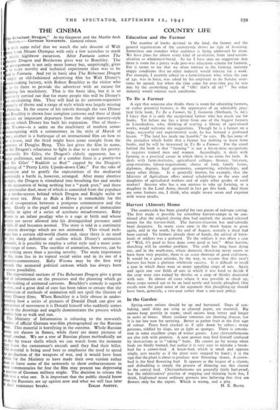To Be a Farmer A sign that someone else thinks
there is room for educating farmers, or rather potential farmers, is the appearance of an admirably prac- tical little book, To Be a Farmer, by J. Gunston (Methuen, 75. 6d.). I fancy that it is only the exceptional farmer who has much use for books. Yet before me lies a letter from one of the biggest farmers in Lincolnshire, who, thinking of starting a library of agricultural works, would welcome my suggestions. Though he is a farmer on a large, successful and experimental scale, he has learned a profound lesson. "The land has made me humble," he says. He has none of the prejudice which holds that a farmer has nothing to learn from books, and he will be interested in To Be a Farmer. For the creed behind the book is that " farming " is not a hit-or-miss occupation; it requires trained men and women. Accordingly, it deals with farming as a practical career in which there is no room for fools. It deals with farm-institutes, agricultural colleges, finance, literature, crop-rotations, labour-requirement, choice of land, family farms, diplomas, degrees, legal agreements, composting, scholarships, and many other things. Is it generally known, for example, that the Ministry of Agriculture offers annual scholarships to the sons and daughters of agricultural workers and of eight other grades of rural worker? Anyone who has a son anxious to take up farming, or a daughter in the Land Army, should in fact get this book. And there are some farmers too, I think, who might invest seven and sixpence with worse results.


























 Previous page
Previous page